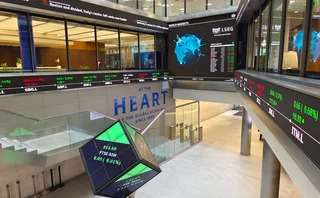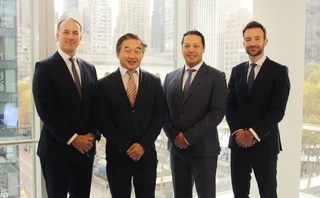
Private bank of the year: Credit Suisse
Asia Risk Awards 2019

Private banking in Asia today has an added growth dimension – a focus on intergenerational planning, with the desire to preserve the family legacy as the founding patriarchs and matriarchs advance in age and are keen to hand over control in the coming decade.
Credit Suisse has led from the front this year, with solid governance and continuous innovation to maintain its standing among the ultra-rich community.
“Over the coming two to three decades, it is expected that multi-trillions in wealth will be transferred to the next generation among Asian wealthy families,” says Francois Monnet, head of private banking North Asia at Credit Suisse. “As a bank, we continue to emphasise our engagement with the next generation to equip them with the necessary tools so that they are more prepared to manage their family wealth or family businesses and to help them to learn how they can preserve their wealth for future generation.”
While the fortune continues to multiply at an unprecedented pace, the Swiss bank is gearing up for the intergenerational challenge by promoting collaborations across functions to deliver institutional-quality advice and execution to affluent families.
Previously, private banking and other functions, such as investment banking and capital markets, used to operate in silos despite being located in the same country and office. Credit Suisse has spent the past 10 years breaking down the walls to fully integrate the private banking division with the rest of the bank and is starting to reap the benefits.
“It is important for all our senior executives to be fluent in both investment banking and private banking businesses,” says Monnet. Now all the business divisions that participate in private banking, regardless of the function or the contribution to the business, are subject to a single oversight in the region.
The changes have already resulted in increased business.
It is important for all our senior executives to be fluent in both investment banking and private banking businesses
Francois Monnet, Credit Suisse
Last year’s performance confirms the success of the integrated mode that also complements the steady growth in relationship manager productivity achieved over the past four years. In 2018, each relationship manager on average contributed $2.8 million in revenue managing $344 million in assets, both up 4% on year.
The alignment among divisions has enabled a comprehensive, long-term lifecycle view for each of the bank’s private banking clients as well, Monnet says.
In Asia, where half of wealth ownership still resides in the hand of the first generation, the bank is adapting the business to suit the needs of an entrepreneurial lifecycle. This cycle begins from financing a start-up to wealth accumulation to asset monetisation and preservation.
The holistic model of Credit Suisse is epitomised by one of its clients with presence in both China and Japan. The bank financed the founder of the business with a $700 million share-backed loan as a lead arranger. It also provided the founder with hedging strategies, bond issuance, and cross-border public and private share placement.
“This demonstrates a strong connectivity bridging the investment banking and capital markets business, and the needs of the investor, facilitated by the private banking side,” he says.
The collaboration between business units is just one part of the changes the lender is putting in place to take on the future challenges. Credit Suisse is also embarking on “aggressive” digital initiatives. One enhancement made was to provide custom-made solutions to each client instead of offering a common solution, says Monnet.
Instead of a discretionary mandate that is entirely delegated to the bank, a typical advisory account is traded by the client themselves. Advised portfolios generally tend to underperform the delegated ones. Between 2015 and 2018, 71% of advisory accounts underperformed the managed solutions fully mandated to the bank, according to Credit Suisse data.
Our selection success has been proven year after year by the outperformance
Francois Monnet, Credit Suisse
While reckoning clients in Asia value their close oversight on the portfolio, the bank launched a hybrid solutions in 2017.
Backed by the in-house digital engine, the platform Credit Suisse Invest blends traditional advisory and discretionary styles of wealth management. Instead of receiving trading ideas from relationship managers every month, investors can set the mobile alerts for timely investment advice by asset classes to avoid ill-timed rebalancing and reallocation.
Empowered by the investment ideas, investors are opened up to a selection pool of a total of 10,000 mutual funds and 1800 exchange-traded funds handpicked by 80 investment strategists around the world.
“Our selection success has been proven year after year by the outperformance,” says Monnet. Over the past four years, 39 out of 48 focus funds saw positive performance and outperformed their benchmark by 1.8% per annum on average.
At end-2018, the entire managed solution universe in Asia-Pacific had $50 billion in client assets, up 79% from three years ago. The money managed represents a penetration of 25% among clients in the region.
The wider digital private banking portal offers risk analytics as well, where clients can evaluate risk attribution, simulate risk scenarios and run investment suitability validations on their mobile device.
The revamp on the digital investment platform is also aimed at easing the intergenerational switch and netting younger clients, who are digitally savvy.
Other programmes aimed at the next generation include educational initiatives aimed at nurturing capable future leaders. These impart knowledge in family business, philanthropy, and onshore and offshore investment.
In Hong Kong and Singapore, a boot camp is organised for the clients’ sons and daughters, for example. Participants are mentored by industry professionals from tech firms including Alibaba Group and Google to create a pitch deck for a start-up idea.
Only users who have a paid subscription or are part of a corporate subscription are able to print or copy content.
To access these options, along with all other subscription benefits, please contact info@risk.net or view our subscription options here: http://subscriptions.risk.net/subscribe
You are currently unable to print this content. Please contact info@risk.net to find out more.
You are currently unable to copy this content. Please contact info@risk.net to find out more.
Copyright Infopro Digital Limited. All rights reserved.
As outlined in our terms and conditions, https://www.infopro-digital.com/terms-and-conditions/subscriptions/ (point 2.4), printing is limited to a single copy.
If you would like to purchase additional rights please email info@risk.net
Copyright Infopro Digital Limited. All rights reserved.
You may share this content using our article tools. As outlined in our terms and conditions, https://www.infopro-digital.com/terms-and-conditions/subscriptions/ (clause 2.4), an Authorised User may only make one copy of the materials for their own personal use. You must also comply with the restrictions in clause 2.5.
If you would like to purchase additional rights please email info@risk.net
More on Awards
Clearing house of the year: LCH
Risk Awards 2025: LCH outshines rivals in its commitment to innovation and co-operation with clearing members
Best use of machine learning/AI: CompatibL
CompatibL’s groundbreaking use of LLMs for automated trade entry earned the Best use of machine learning/AI award at the 2025 Risk Markets Technology Awards, redefining speed and reliability in what-if analytics
Markets Technology Awards 2025 winners’ review
Vendors jockeying for position in this year’s MTAs, as banks and regulators take aim at counterparty blind spots
Equity derivatives house of the year: Bank of America
Risk Awards 2025: Bank gains plaudits – and profits – with enhanced product range, including new variants of short-vol structures and equity dispersion
Law firm of the year: Linklaters
Risk Awards 2025: Law firm’s work helped buttress markets for credit derivatives, clearing and digital assets
Derivatives house of the year: UBS
Risk Awards 2025: Mega-merger expected to add $1 billion to markets revenues, via 30 integration projects
Interest rate derivatives house of the year: JP Morgan
Risk Awards 2025: Steepener hedges and Spire novations helped clients navigate shifting rates regime
Currency derivatives house of the year: UBS
Risk Awards 2025: Access to wealth management client base helped Swiss bank to recycle volatility and provide accurate pricing for a range of FX structures







